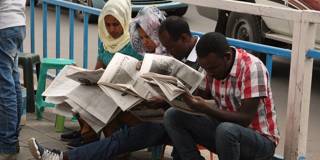While social-media platforms offer speed and accessibility, a credible free press – committed to finding the truth and informing the public – remains vital to support accountability in places where it is often hard to find. To fulfill their role, however, independent news organizations need sufficient funding.
ABUJA – In June, Senegalese President Macky Sall’s brother, Aliou Sall, resigned from his post as the head of a state-run savings fund, following public outrage over allegations (which he denies) that he was involved in corrupt oil and gas deals. That outrage was expressed via social media and on the streets of Dakar. But it was investigative journalism, carried out by the BBC, that triggered it, highlighting traditional media’s enduring power to effect change.
While social-media platforms get a lot of attention for their speed and accessibility, a credible free press – which does not simply parrot the official line of governments or special interests, but rather seeks the truth – remains essential to strengthening accountability in places where it can often be hard to find. And independent investigative journalists in Africa have often exposed high-level corruption, abuse of power, and shady business deals.
For example, in Kenya, a leading local newspaper reported that Philip Kinisu, former chairman of the Ethics and Anti-Corruption Commission, had received suspicious payments from the National Youth Service. Further investigations into the NYS revealed more corrupt deals, spurring Kenyans to take to the streets in protest.

ABUJA – In June, Senegalese President Macky Sall’s brother, Aliou Sall, resigned from his post as the head of a state-run savings fund, following public outrage over allegations (which he denies) that he was involved in corrupt oil and gas deals. That outrage was expressed via social media and on the streets of Dakar. But it was investigative journalism, carried out by the BBC, that triggered it, highlighting traditional media’s enduring power to effect change.
While social-media platforms get a lot of attention for their speed and accessibility, a credible free press – which does not simply parrot the official line of governments or special interests, but rather seeks the truth – remains essential to strengthening accountability in places where it can often be hard to find. And independent investigative journalists in Africa have often exposed high-level corruption, abuse of power, and shady business deals.
For example, in Kenya, a leading local newspaper reported that Philip Kinisu, former chairman of the Ethics and Anti-Corruption Commission, had received suspicious payments from the National Youth Service. Further investigations into the NYS revealed more corrupt deals, spurring Kenyans to take to the streets in protest.